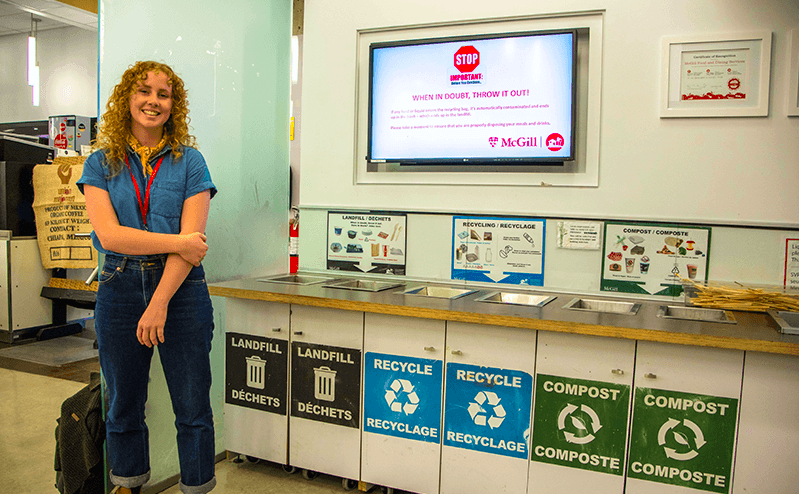Hey there, folks! Today I’d like to talk about something which is very close to my heart: living consciously when where you live doesn’t necessarily make it the easiest. Specifically in this post, I’m going to start a conversation surrounding all the ups and downs of dorm living!
In my first year at McGill University — which was over two years ago now — I lived in residence. It was certainly a challenging experience for me. However, one of the wonderful upsides of my dorm experience was getting to learn all about sustainability! Coming from a small town, our dining halls’ compost and recycling bins were my first exposure into waste sorting, which sparked a larger interest for me and eventually led to me launching Ethigirl the following summer. What’s more, I actually worked in our dining halls this past September teaching this year’s residence students all about waste sorting!
Me working as a Waste Educator in McGill University’s dining halls, courtesy of this article!
So, needless to say, I think that residence can be an amazing incubator for sustainable living! You just need the right tools. And that, friends, is what I want to explore here! Keep in mind that many of these tips and tricks can be applied in all sorts of living situations, whether you’re still living at home with family, in an apartment, travelling a lot, or any other experiences you might be currently having.
Whatever your situation, what’s important is to remember to do your best. Nobody is going to be perfect: that’s just not the way our system is currently designed. However, if everybody does a little bit, we’re on our way to a much better system. So, let’s get into the suggestions!
Make a Reusables To-Go Kit
Something that has been a lifesaver for me in creating less waste is ensuring I carry around the proper tools that will allow me to do so. If I don’t have my reusables easily accessible to me, then chances are I’m going to do the convenient thing and take the disposable option.
The main things that I like to carry around are a reusable utensil, a water bottle, and a thermos. Of course, I also always pack my lunch or snacks in a tupperware, jar, or bento box, but I don’t carry these around on a just-in-case basis considering my back is only so strong and my bag is only so big! Bonus tip: I always save my empty pasta jars to store smoothies, drinks, or dried goods like beans or oats!
I feel so much more put-together and responsible when I have these things with me. I also think it’s important to recognize that although we often see these “reusable kits” as being aesthetically beautiful, complete with all kinds of bamboo and glass, this doesn’t have to be the case. Use what you have: whether that be a washed-out yogurt container or literally just a fork from your utensils drawer.
When I lived in residence, our dining halls actually provided us with reusable to-go containers, as well as coffee mugs that we could receive a discount on drinks with if we used there!
Choose Ethical and Sustainable Dining Options Whenever Possible
Every school is different, and I must say that I was spoiled with ethical and sustainable food options at my dining halls. However, there is a way to eat better regardless of your meal hall’s situation!
First up, choose Fairtrade products absolutely whenever you can. The most common Fairtrade products that you might see are coffee, tea, and chocolate. If you aren’t familiar with what Fairtrade is, as one word it represents a rigorous certification that companies and goods can apply to have their goods certified under. The holistic standards which are considered include the wages and conditions within which the employees work, whether companies can prove no child labour was used, and how sustainable the materials and practices used to make the goods are. If you’d like to read more about Fairtrade, you can here! As a long-time advocate and an involved member of the movement, I can tell you that I wholeheartedly support everything that it is.
Next up, choose locally whenever possible. My school occasionally offered fruits and veggies that were grown at on-campus farms and partnered with many other local producers. Local foods usually mean long-term partnerships and stronger connections with producers, as well as less “food miles”. The less distance the food has had to travel to get to your plate, the better this is for the environment!
Finally, choose meatless or animal product-less meals whenever you can. As a vegetarian, I’m very aware that this isn’t feasible for everyone to do all of the time, and I’ve had my own struggles with it. Many dining halls also do not offer nutritious or great-tasting vegetarian and vegan options for students. However, challenge yourself to eat a couple or even just one of these types of meals a week! You might even consider trying out Meatless Mondays, which are exactly what they sound like. If you want to read more about why reducing your animal product consumption is just so impactful, check out this article.
Reduce Your Energy Consumption (Even Though You Don’t Pay for It)
In first year, I lived in a really old building within an absolutely freezing city; therefore, I am not going to tell you to turn off your heat.
However, maybe just turn it down when you leave the house?
Try to remember to stop using passive energy, whenever it is possible for you. If your residence has common rooms that you use a lot like mine did, perhaps you can turn off the heat and lights when you’re not occupying them! Furthermore, remember to turn off all your lights when you’re not at home. Though certainly not anywhere close to the biggest factor in climate change, these are small, very mindless activities that can be negatively impactful. And when you don’t have to pay an energy bill, you have no individualized incentive to remember not to do them. So, here’s your reminder!
Get Involved!!!
Let’s shift to some more collective ways to make a difference.
University is the absolute best place to get involved with activism, charity, and politics, and you’d be crazy not to give it a shot. It’s a live-in hub of incredible people doing inspiring work and creating limitless movements on the daily. The people that I have met at university are the ones who inspired me to start Ethigirl, to become a vegetarian, to learn more about politics, and to generally be more open-minded, more passionate, and to learn every single day. You have access to a holistic world of education that extends far, far past the classroom and even challenges what you learn there. You can hold accountable large institutions because of the sheer mass of people who will support your actions.
Needless to say, I feel extraordinarily privileged to have the means to attend university and grow past the person I ever thought I would become. However, even if you’re not a university student, you can still join a club, an association, or an organization. Try to access a host of different offerings, such as charity, fundraising , or political clubs.
Our protest signs from the Montreal Climate Strike in September (which over 500,000 people showed up for!)
Some specific examples of events or initiatives you could become part of (or even organize!) could include clothing swaps, climate strikes for Fridays for Future (an excellent and incredibly timely thing to get involved in which I discussed here), or other environmental advocacy groups. Whatever you do, just try out as many as you can until you find one where you feel at home.
Conclusion
I hope some or all of these tips were helpful to you. Please keep in mind that even if you’re not a university student, or even a student at all, many of these things are just as applicable! Creating less waste, buying better, and getting involved in communities of organizers are all things you can do regardless of what you’re up to in life at the moment.
Got any other tips? Let me know in the comments below! Looking forward to hearing from you.
With love and sustainability,
Ethigirl





